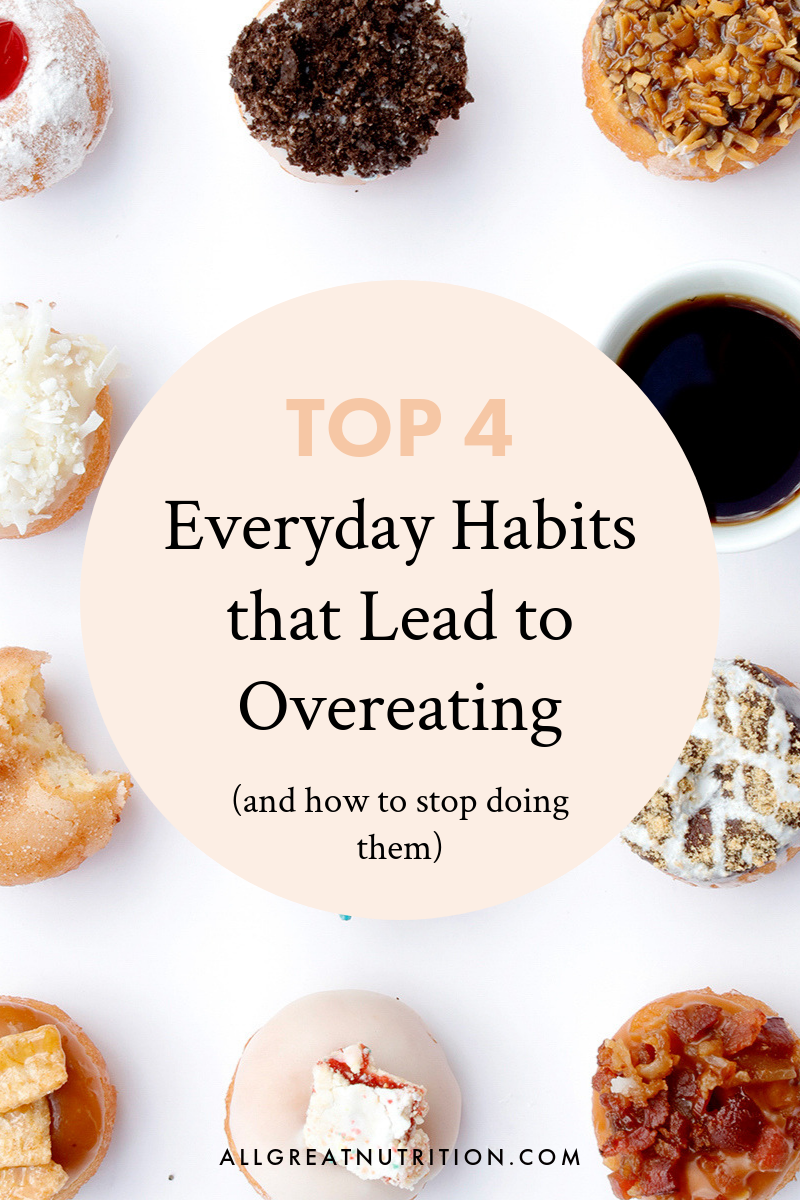4 Everyday Habits that Lead to Overeating (And How to Stop Doing Them)

Stopping your overeating habit can be incredibly challenging and very frustrating for a lot of people.
We all have to eat, but for people who compulsively overeat, eating becomes a big source of stress and anxiety that can have a big impact on their wellbeing.
If only it were easier to just eat when we are hungry and stop when we are full. It can be so hard to stop overeating because our eating habits are influenced by so many things, including physiological, psychological, behavioral, and environmental factors. Together, these factors are the driving force behind what we eat, when we eat, and how we eat. The good news is that many of these factors are within our control to change. It may take some extra time and support to kick your overeating habit, but it is absolutely possible!
If you want to take the first step to stop overeating, then this post is for you! Keep reading to learn about some common habits that lead to overeating and my simple strategies to stop doing them.
4 Everyday Habits that Lead to Overeating (and how to stop doing them)
01 - RESTRICTIVE DIETING
Restrictive dieting is probably the number one biggest trigger that leads to overeating. Years and years of restrictive dieting leaves you feeling anxious, depressed, and totally out of control of your weight.
If resonates with you, know that you are not alone and that it is not your fault! Several studies have actually shown that restrictive diets can have a huge impact on your mental health. The Minnesota Starvation Experiment, which was published in 1950, is one of most referenced and comprehensive research studies on the physiological and psychological effects of hunger.
Results from this study found that semi-starvation in "normal-weight" adults led to severe emotional stress, depression, food obsession, social withdrawal, and decreased metabolism. Researchers defined semi-starvation as a calorie restriction that resulted in a 25% total body weight loss over a 6-month period.
Let's review a quick example to understand exactly how much weight loss produced these dramatic results. If a 180-pound man loses 25% of his body weight in 6 months, that is equivalent to losing 45 pounds in 6 months or about 7.5 pounds per month. I don't know about your guys, but I find it pretty incredible that a relatively moderate amount of weight loss can have such a negative impact on your mental health.
After 6-months of semi-starvation participants in the study were re-fed in two stages, unrestricted and restricted re-feeding. During the unrestricted re-feeding stage, participants were allowed to eat at their free will. Not surprisingly, most of the participants overate, binged, and gained back all of the weight that they lost during the semi-starvation period of the study. At the end of the year-long study, most of the participants weighed about 10% more than they had before starting the experiment!
Findings from The Minnesota Starvation Experiment are used as a basis of understanding eating disorders and how hunger effects both mental and physical health.
More recently, scientists have uncovered some of the biological mechanisms by which restrictive dieting leads to overeating and weight gain. Rapid weight loss triggers your fat cells to release hormones and chemical signals to your brain that increase appetite and decrease metabolism.
So, if you find yourself compulsively overeating after dieting it is not because you lack willpower or discipline. The psychological, behavioral, and physiological effects of hunger are likely triggering you to overeat! Stop the cycle. Stop restrictive dieting.
How to Stop Restrictive Dieting
01
Keep in mind that there is no quick fix and no one-size-fits-all solution to stop restrictive dieting. People learn behaviors under unique circumstances and changing those behaviors also takes a personalized approach.
02
Start is with mindfulness. Identify your triggers (emotional, environmental, physical) for restricting and/or overeating.
03
Self-monitoring your eating habits is a great way to bring awareness to your personal triggers to restrict and/or overeat (try my eating awareness journal to start self-monitoring now).
04
Now that you understand the psychological and physiological forces behind the restrictive dieting and overeating cycle you can see how challenging it can be to stop the cycle on your own. Work with a professional to stop the cycle once and for all! Contact me HERE to get started!
02 - SKIPPING MEALS
Research on this topic is very mixed, but I still truly believe that finding an eating schedule that works for your body is essential in preventing overeating, and managing your weight and stress response.
While it is true that some people feel better when eating infrequently (1 - 2 times per day or intermittent fasting of various degrees), I have found that most people who skip meals or go for long periods of time without eating are prone to overeating, weight gain, and even anxiety.
Skipping meals is big trigger for overeating because it throws your blood sugar (aka blood glucose) out of wack, making it super difficult to eat mindfully. Blood sugar provides essential fuel for your body's tissues and organs, especially your brain.
Skipping meals can cause your blood sugar to drop dramatically, which triggers the release of several stress-related hormones, including cortisol. Cortisol causes your blood sugar to rise rapidly by stimulating your liver to make and release glucose into the blood.
Cortisol also triggers insulin resistance (a metabolic condition that increases hunger, decreases fat metabolism, and contributes to weight gain and type 2 diabetes) in your muscles and other tissues, which causes glucose to stay in your blood. This extreme elevation of blood sugar triggers a compensatory release of insulin, which increases hunger and promotes fat storage.
You can see how skipping meals can actually intensify your hunger and make it extremely difficult to regulate your appetite.
How to Stop Skipping Meals
01
You don’t have to do a full weekend of batch-cooking, but make sure you are eating something every 3 - 5 hours. Set alarms or make a loose or detailed plan of what you are going to eat and when.
02
Track your meal timing, food, hunger, energy and stress levels to find out which eating schedule is best for your body.
03 - EATING TOO QUICKLY
Satiety, or the feeling of fullness after a meal, is regulated by a network of signals between your gastrointestinal system and the appetite-regulating neurons in your central nervous system.
You have stretch receptors in the lining of your stomach that are activated as your stomach fills with food and liquid when you eat. Signals from these receptors tell your brain that your are full, which encourages you to stop eating.
When partially digested food reaches the small intestine, it also triggers the release of several appetite-regulating hormones, including cholecystokinin (CCK), peptide YY (PYY), oxyntomodulin (OXM), and glucagon-like-peptide-1 (GLP-1). All of these hormones inhibit appetite and encourage you to stop eating.
Eating slowly allows your brain enough time to receive these signals from your digestive system, which in turn decreases appetite and helps you to stop eating when you feel full.
How to Eat More Slowly
01
Put your fork, spoon, or hand down between each bite. This simple strategy helps you slow down and be more mindful of how much you are eating.
02
Give yourself at least 20 minutes to finish a meal or snack. This is about the amount of time it takes for your brain to register the satiety signals from your gastrointestinal tract.
03
Use the Eating Awareness Journal to track how fast you are eating, and make a goal to increase your eating time by 5 minutes every week.
04
Work with me for more mindful and intuitive eating techniques like these. Contact me HERE for more info!
04 - NOT GETTING ENOUGH SLEEP
Getting enough sleep is essential for pretty much every aspect of your health, including maintaining a healthy weight and controlling your appetite.
Scientists have recently discovered that sleep deprivation is powerful enough to actually increase appetite and decrease metabolism. One research study even found that people who don't get enough sleep eat 20% more than they normally would. That could be an additional 240 to 400 calories per day (based on a 1200 - 2000 calorie diet), just from one night of sleeping less than 6 hours!
Another study found that getting less than 6 hours of sleep in just one night causes changes in several appetite and weight regulating hormones, including insulin, cortisol, and leptin.
Even just one night of sleep deprivation can cause insulin resistance. Sleep deprivation also increases the production of cortisol, which we know increases blood sugar and decreases fat burning and metabolic rate.
Leptin is a chemical messenger produced by your fat cells that tells your brain you are full. Sleep deprivation decreases leptin levels in your body, which makes you feel hungry and crave carbohydrate-rich foods.
This diagram illustrates the many ways sleep deprivation leads to overeating and weight gain.

How Sleep Deprivation Influences Weight Gain
Obesity (Silver Spring). 2008 Mar;16(3):643-53. doi: 10.1038/oby.2007.118. Epub 2008 Jan 17.
How to Get More Sleep
01
Get sunlight at least 20 minutes per day to regulate circadian rhythms and melatonin production.
02
For more tips on how to get a good night sleep read my previous post here and here.
FINAL THOUGHTS
Now that you have a better idea of the science behind some of the habits that trigger overeating, you can take the first steps to stop.
But first, I want to let you know that change takes time and it is okay if you start working changing just one of these habits. In fact, I encourage you to start working on only one habit at a time.
These tips are meant to be doable and not overwhelming! Take it slow and start by recording in your Eating Awareness Journal. For some people, just writing this stuff down is enough to cause positive changes in their eating habits.
What are your favorite strategies to kick your overeating habit? Try these out and share your experience with me in the comment section!
Love this post? Pin in for later!

AFFILIATE DISCLOSURE
This post may contain affiliate links, which means that All Great Nutrition may receive a percentage of a product or service you purchase using the links in the post. You will pay the same price for all products and services, but your purchase helps support our ongoing work to help others be healthy and happy. Thanks for your support!

Hey! I’m Tamar…









